Aubin, Aveyron
Aubin (Languedocien: Aubinh) is a commune in the Aveyron department in the Occitanie of southern France.
Aubin | |
|---|---|
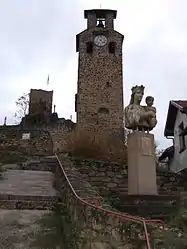 Fort Aubin | |
.svg.png.webp) Coat of arms | |
Location of Aubin 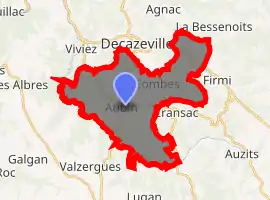
| |
 Aubin  Aubin | |
| Coordinates: 44°31′43″N 2°14′48″E | |
| Country | France |
| Region | Occitanie |
| Department | Aveyron |
| Arrondissement | Villefranche-de-Rouergue |
| Canton | Enne et Alzou |
| Intercommunality | CC Decazeville Communauté |
| Government | |
| • Mayor (2014-2020) | André Martinez |
| Area 1 | 27.23 km2 (10.51 sq mi) |
| Population (2017-01-01)[1] | 3,761 |
| • Density | 140/km2 (360/sq mi) |
| Time zone | UTC+01:00 (CET) |
| • Summer (DST) | UTC+02:00 (CEST) |
| INSEE/Postal code | 12013 /12110 |
| Elevation | 211–500 m (692–1,640 ft) (avg. 342 m or 1,122 ft) |
| 1 French Land Register data, which excludes lakes, ponds, glaciers > 1 km2 (0.386 sq mi or 247 acres) and river estuaries. | |
The inhabitants of the commune are known as Aubinois.[2]
Geography
Aubin is located some 20 km south-east of Figeac and immediately south of Decazeville. Access to the commune is by road D 5 from Viviez in the north-west which passes through the centre of the commune and the town and continues south to Montbazens. The D221 goes from the town north to Decazeville. The D 11 goes east from the town to Cransac. The minor D 513 road branches off the D 5 on the north-western border of the commune and goes east through the north of the commune to Firmi. The Capdenac-Gare to Rodez railway line passes through the commune and there is a station at the town. Apart from the town there are the hamlets and villages of Severac, Ruffies, Cerons, La Croix du Broual, Combes, Tramons, Ruau, Les Escabrins, and Saugiere. The commune is mixed forest and farmland with significant sized urban areas.[3]
The Riou Morte flows through the north-eastern corner of the commune as it flows north-west before turning west at Decazeville. The Enne river flows through the commune and the town from the east and continues north-west to join the Riou Morte at Viviez. The Ruisseau du Banel flows from the east north of the village and joins the Enne on the north-western border of the commune.[3]
Neighbouring communes and villages
History
Classical Antiquity
Lucien Mazars, an author of numerous books on local history, wrote in Aubin; its history, from its origins to the Revolution of 1789: "tradition [says] that Aubin, which bore the name Albin until the end of the 18th century, was founded by the Roman General Declus Clodius Albinus or in his honour". However, General Albinus did not exercise the functions of a legate in Gaul but rather in Roman Britain. His control of Gaul was probably too short to be able to found a town.
Middle Ages
Fort Aubin initially served as a fortress and then was occupied during the Middle Ages by the Lords of Rouergue. The town became the center of important coal mines, and also had iron mines.[4]
Contemporary era
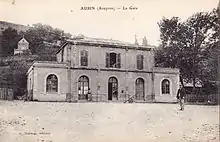
The commune was the capital of the District of Aubin from 1790 to 1800.
In October 1869 soldiers fired on a demonstration of miners killing 14 and injuring 20.[5] This was the second strike in the Second Empire after the one in June 1869 at La Ricamarie.[6] Captain Bernard Gosseran who gave the order to fire on strikers was later made a chevalier of the Legion of Honour. This tragedy inspired the Ode à la Misère (Ode to Misery)[Note 1] and the Aubin[7] poems to Victor Hugo.
Aubin railway station on the Capdenac-Gare to Rodez line opened in 1858.
Heraldry
.svg.png.webp) Arms of Aubin |
Blazon: Gules, a lion of Or, in chief Sable, a pick-axe to sinister and a hammer to dexter of Argent handled of Or posed saltirewise debruised by a miner's lamp of Argent lighted in Gules.[8] |
Administration
List of Successive Mayors[9]
| From | To | Name | Party | Position |
|---|---|---|---|---|
| 1790 | 1791 | Jacques Rouch Labraguiere | ||
| 1791 | 1792 | Antoine de Lalande | ||
| 1792 | 1794 | Joseph Domergue | ||
| 1794 | 1794 | Joseph Alary | ||
| 1794 | 1795 | Joseph Domergue | ||
| 1795 | 1796 | Dominique Lalande | ||
| 1796 | 1796 | Jean-Jacques Descrozaille | ||
| 1796 | 1799 | Jean-Baptiste Bessiere | ||
| 1799 | 1800 | Dominique Lalande | ||
| 1800 | 1813 | Jean-Jacques Descrozaille | ||
| 1813 | 1844 | Brassat Saint-Parthem | ||
| 1844 | 1848 | Eugène Alary | ||
| 1848 | 1870 | Auguste Maruejouls | ||
| 1870 | 1871 | Adolphe Segala | ||
| 1871 | 1872 | Auguste Maruejouls | ||
| 1872 | 1881 | Charles Coince | ||
| 1881 | 1894 | Henri Descrozaille | ||
| 1894 | 1900 | Jean Barbau | ||
| 1900 | 1904 | Henri Descrozaille | ||
| 1904 | 1924 | Jules Cabrol | ||
| 1924 | 1935 | Albert Maurs | ||
| 1935 | 1939 | Edmond Ginestet |
- Mayors from 1939
| From | To | Name | Party | Position |
|---|---|---|---|---|
| 1939 | 1944 | Prosper Vergnes | ||
| 1944 | 1944 | Jean Nicot | ||
| 1944 | 1963 | Edmond Ginestet | ||
| 1963 | 1965 | Jean Martin | ||
| 1965 | 1971 | René Gres | ||
| 1971 | 1989 | Lucien Mazars | ||
| 1989 | 1995 | Robert Debuchy | ||
| 1995 | 2008 | Pierre Beffre | PS | |
| 2008 | 2020 | André Martinez |
(Not all data is known)
Demography
In 2017 the commune had 3,761 inhabitants.
|
| ||||||||||||||||||||||||||||||||||||||||||||||||||||||||||||||||||||||||||||||||||||||||||||||||||||||||||||||||||
| Source: EHESS[10] and INSEE[11] | |||||||||||||||||||||||||||||||||||||||||||||||||||||||||||||||||||||||||||||||||||||||||||||||||||||||||||||||||||
Culture and heritage
Civil heritage
The commune has two buildings and structures that are registered as historical monuments:
- 2 Factory Chimneys (1847)
 [12]
[12] - The Jules Ferry du Gua School (1876).
 [13] Designed by Emmanuel Brune and built between 1876 and 1880. It is 59 metres long and 12 metres wide built on a terrace overlooking the small houses which make up the suburb of Gua.
[13] Designed by Emmanuel Brune and built between 1876 and 1880. It is 59 metres long and 12 metres wide built on a terrace overlooking the small houses which make up the suburb of Gua. - The Town Hall contains several items that are registered as historical objects:
- Other sites of interest
- The Departmental House of Memory: Museum of resistance, deportation, and citizenship
- The Museum of Mines
Religious heritage
The commune has several religious buildings and structures that are registered as historical monuments:
- The Church of Notre-Dame-des-Mines (1942).
 [18] The Church also contains many items that are registered as historical objects:
[18] The Church also contains many items that are registered as historical objects:
- A set of monumental paintings: Resurrection and Appearance of Christ, Ascension of Christ, Crowning of the Virgin (20th century)
 [19]
[19] - A painting: Wayside Cross (1952)
 [20]
[20] - A set of monumental paintings: Virgin and Child, Calvary and episodes of life of miners, Saint Famille (1951)
 [21]
[21] - A set of monumental paintings and Wayside Cross: Cycle of the Passion of Christ, Episodes of life of miners (1951, 1952)
 [22]
[22]
- A set of monumental paintings: Resurrection and Appearance of Christ, Ascension of Christ, Crowning of the Virgin (20th century)
- The Church of Saint-Blaise (1486).
 [23] The Church also contains many items that are registered as historical objects:
[23] The Church also contains many items that are registered as historical objects:
- A Statue: Virgin and Child (16th century)
 [24]
[24] - A Group Sculpture: The Resurrection (15th century)
 [25]
[25] - A Statue: Christ on the Cross (12th century)
 [26]
[26] - A Group Sculpture: The Baptism of Christ (15th century)
 [27]
[27] - A Baptismal font (13th century)
 [28]
[28] - A Consecration Cross (12th century)
 [29]
[29] - An Altar (12th century)
 [30]
[30]
- A Statue: Virgin and Child (16th century)
- The Church of Gua (1865)
 [31]
[31]
Facilities
Sports
- The Étoile Sportive de Combes, a football club since 1921.[32]
Notable people linked to the commune
- François Cogné, sculptor.
- Marie-Claire Bancquart, university professor, writer and poet, born in Aubin in 1932.
- Serge Mesonès, French footballer, born in 1948, died in 2001 at Aubin.
- Lilian Bathelot, novelist, author, born at Aubin in 1959.
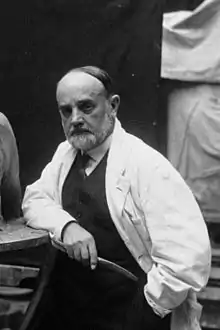
François Cogné in 1931. 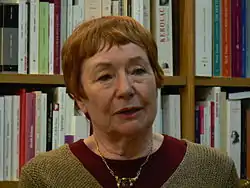
Marie-Claire Bancquart in 2010. 
Lilian Bathelot in 2010.
See also
Bibliography
- Lucien Mazars, Aubin, its history from its origins to the Revolution of 1789, L. Mazars, Aubin, 1982, 119 pages, Cov. ill., ill., 22 cm, BNF 34761590s (in French)
- Lucien Mazars, Mining Land, Aubin-Decazeville basin, Fil d'Ariane, Rodez, 1999, 285 pages, ill., cov. ill., 22 cm, ISBN 2-912470-16-1, BnF 36978991r (in French)
- Lucien Mazars and Francis Mazars, Mining Land in pictures, Decazeville-Aubin basin, Association des amis du Musée de la mine Lucien Mazars, Aubin, 2009, 265 pages, ill. in b&w and colour., cov. ill., 24 cm, ISBN 978-2-7466-0685-2, BnF 41491412h (in French)
- Madeleine Raygade-Panassié, Memories of Combes, coal and fire country, Association des amis du Musée du Rouergue, Rodez, 1994, 99 pages, ill., cov. ill., 24 cm, BnF 366921465 (in French)
- Christian-Pierre Bedel, preface by Pierre Beffre, Aubinh, Cransac, Firmin, Vivièrs / Christian-Pierre Bedel e los estatjants del canton d'Aubinh, Al canton collection, Mission départementale de la culture, Rodez, 1998, 247 pages, ill., cov. ill., 28 cm, ISBN 2-907279-38-6, ISSN 1151-8375, BnF 36708370b (in Spanish)
- Michel Girval, Aubin, Le Gua, Combes in the time of old postcards, Amicale laïque et républicaine de la commune d'Aubin, Aubin, 1999, 200 pages, ill., cov. ill. in colour, 30 cm, ISBN 2-9513481-0-X, BnF 37038703v (in French)
- Engineer Senez, Aubin - Geological Map of the coal basin of Aubin (Aveyron) made in 1840, Cartographic Manuscript Document, s.n., s.l., 1840, 1 flle: ms., 40x48 cm, BnF 407204575 (in French) See online
- Marie-Line Montbroussous, History of a successful integration, the Spaniards in the Decazeville basin, Éd. du Rouergue, Rodez, 1995, 199 pages, ill., cov. ill., 23 cm, ISBN 2-905209-99-2, BnF 36685891f (in French)
- Gérard Pertus and Michel Herranz, Basin of Decazeville, Aubin, Cransac, Firmi, Viviez, factories and metalworkers. Vol. 1, Association de sauvegarde du patrimoine industriel du Bassin de Decazeville, Decazeville, 2010, 238 pages, ill., cov. ill., 31cm, ISBN 978-2-9531052-3-0, BnF 42307098h (in French)
- Gérard Pertus and Michel Herranz, Basin of Decazeville, Aubin, Cransac, Firmi, Viviez, factories and metalworkers. Vol. 2, Association de sauvegarde du patrimoine industriel du Bassin de Decazeville, Decazeville, 2012, 237 pages, ill., cov. ill., 31cm, ISBN 978-2-9531052-4-7, BnF 43520392g (in French)
- Gérard Pertus and Michel Herranz, Mines and miners, Decazeville basin: Aubin, Cransac, Firmi, Viviez, Association de sauvegarde du patrimoine industriel du Bassin de Decazeville, Decazeville, 2008, 211 pages, ill., cov. ill., 31cm, ISBN 978-2-9531052-1-6, BnF 41420313w (in French)
- Gérard Pertus and Michel Herranz, Mine Pits, Decazeville basin: Aubin, Cransac, Firmi, Viviez, Association de sauvegarde du patrimoine industriel du Bassin de Decazeville, Decazeville, 2007, 117 pages, ill., cov. ill., 31 cm ISBN 978-2-9531052-0-9, BnF 411843247 (in French)
- Christian-Pierre Bedel, preface Pierre Beffre, Aubinh, Cransac, Firmin, Vivièrs / Christian-Pierre Bedel e los estatjants del canton d'Aubinh, Rodez, Mission départementale de la culture, 1998, Al canton coll., 247 pages, ill., cov. ill., 28 cm, ISBN 2-907279-38-6, ISSN 1151-8375, BnF 36708370 (in French)
External links
- Aubin official website (in French)
- Church of Notre-Dame website (in French)
- Aubin on the old IGN website (in French)
- The Miner on the sculptor's website (in French)
- Aubin on Géoportail, National Geographic Institute (IGN) website (in French)
- Albin on the 1750 Cassini Map
Notes and references
Notes
- The poem in the original French:Victor Hugo,Ode à la Misère
" - Quel âge as-tu ? - Seize ans.
- De quel pays es-tu ? D'Aubin.
- N'est-ce pas là, dis-moi, qu'on s'est battu?
On ne s'est pas battu, l'on a tué.
- La mine Prospérait.
- Quel était son produit ? - La famine.
Oui, je sais, le mineur vit sous terre, et n'a rien.
Avec la nuit de plus, il est galérien.
- Mais toi, faisais-tu donc ce travail, jeune fille ?
- Avec tout mon village et toute ma famille,
Oui. Pour chaque hottée on me donnait un sou.
Mon grand-père était mort, tué du feu grisou.
Mon petit frère était boiteux d'un coup de pierre.
Nous étions tous mineurs, lui, mon père, ma mère,
Moi. L'ouvrage était dur, le chef n'était pas bon.
Comme on manquait de pain, on mâchait du charbon.
Aussi, vous le voyez, monsieur, je suis très maigre ;
Ce qui me fait du tort - Le mineur, c'est le nègre.
Hélas, oui ! - Dans la mine on descend, on descend.
On travaille à genoux dans le puits. C'est glissant.
Il pleut, quoiqu'on n'ait pas de ciel. On est sous l'arche
D'un caveau bas, et tant qu'on peut marcher, on marche ;
Après on rampe ; on est dans une eau noire ; il faut
Étayer le plafond, s'il a quelque défaut ;
La mort fait un grand bruit quand tout à coup elle entre ;
C'est comme le tonnerre. On se couche à plat ventre.
Ceux qui ne sont pas morts se relèvent. Pas d'air.
Chaque sape est un trou dont un homme est le ver.
Quand la veine est en long, c'est bien ; quand elle est droite,
Alors la tâche est rude et la sape est étroite :
On sue, on gèle, on tousse ; on a chaud, on a froid.
On n'est pas sûr si c'est vivant tout ce qu'on voit.
Sitôt qu'on est sous terre on devient des fantômes.
Les pauvres paysans qui vivent sous les chaumes
Respirent du moins l'air des cieux. On étouffait.
- Pourquoi ne pas vous plaindre aussi ? - Nous l'avons fait.
Nous avons demandé, ne croyant pas déplaire,
Un peu moins de travail, un peu plus de salaire.
- Et l'on vous a donné, quoi ? - Des coups de fusil.
Je m'en souviens, le maître a froncé le sourcil.
Mon père est mort frappé d'une balle. - Et ta mère ?
- Folle. - Et tu n'as plus rien ? - Si. J'ai mon petit frère.
Il est infirme… "
References
- "Populations légales 2017". INSEE. Retrieved 6 January 2020.
- Inhabitants of Aveyron (in French)
- Google Maps
- Chisholm, Hugh, ed. (1911). . Encyclopædia Britannica. 2 (11th ed.). Cambridge University Press. p. 891.
- Georges Soria, Grand History of the Commune, Édition du centenaire 1971, T.I p.126 (in French)
- Henri Guillemin, The coming of Mr. Thiers, Édition Utovie (in French)
- Victor Hugo (1898). "L Aubin". Les années funestes (in French)..
- Brian Timms Archived March 25, 2010, at the Wayback Machine
- List of Mayors of France (in French)
- Données Cassini, EHESS
- Population en historique depuis 1968, INSEE
- Ministry of Culture, Mérimée PA12000046 2 Factory Chimneys (in French)
- Ministry of Culture, Mérimée PA12000024 Jules Ferry du Gua School (in French)
- Ministry of Culture, Palissy IM12000362 Statue: Maid of Honour at the Court of Francis I (in French)
- Ministry of Culture, Palissy IM12000361 Painting with frame:Miners of the Saar (in French)
- Ministry of Culture, Palissy IM12000360 Painting with frame: Unnamed abstract (in French)
- Ministry of Culture, Palissy IM12000359 Painting with frame: Confidences (in French)
- Ministry of Culture, Mérimée PA12000021 Church of Notre-Dame-des-Mines (in French)
- Ministry of Culture, Palissy IM12000382 Set of monumental paintings: Resurrection and Appearance of Christ, Ascension of Christ, Crowning of the Virgin (in French)
- Ministry of Culture, Palissy IM12000381 Painting: Wayside Cross (in French)
- Ministry of Culture, Palissy IM12000380 Set of monumental paintings: Virgin and Child, Calvary and episodes of life of miners, Saint Famille (in French)
- Ministry of Culture, Palissy IM12000363 Set of monumental paintings and Wayside Cross: Cycle of the Passion of Christ, Episodes of life of miners (in French)
- Ministry of Culture, Mérimée PA00093957 Church of Saint-Blaise (in French)

- Ministry of Culture, Palissy PM12000008 Statue: Virgin and Child (in French)

- Ministry of Culture, Palissy PM12000765 Group Sculpture: The Resurrection (in French)
- Ministry of Culture, Palissy PM12000007 Statue: Christ on the Cross (in French)

- Ministry of Culture, Palissy PM12000006 Group Sculpture: The Baptism of Christ (in French)

- Ministry of Culture, Palissy PM12000005 Baptismal Font (in French)

- Ministry of Culture, Palissy PM12000004 Consecration Cross (in French)
- Ministry of Culture, Palissy PM12000003 Altar (in French)

- Ministry of Culture, Mérimée PA12000027 Church of Gua (in French)
- Étoile sportive de Combes website (in French)
| Wikimedia Commons has media related to Aubin, Aveyron. |